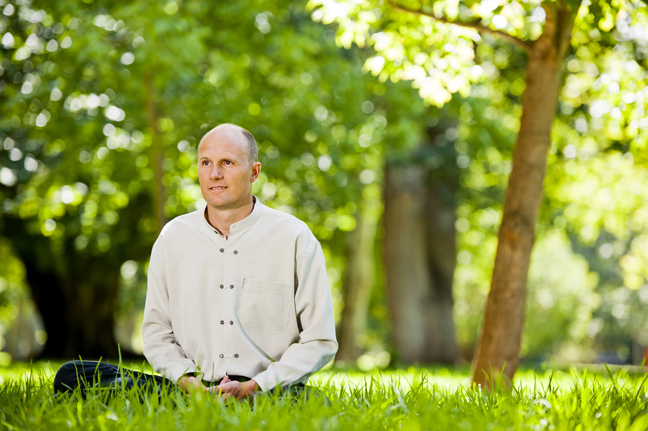
For original article please click here:
Recently, Peter was interviewed by Mystic Mag on his personal journey and evolution of Skillful MIND. Below is the transcript of this insightful interview:
Skillful Mind’s retreats aim to help people reconnect with themselves. What does ‘reconnection with self’ mean to you, and how do you guide participants to begin this journey?
To reconnect with ourselves, we need to understand that most people are caught up in their minds and their thoughts. But these thoughts are not essentially who we are. Learning to step out of the thinking mind and into a state of awareness or mindfulness—or what some might even call “source”—allows us to access a more authentic self. From this position, we can observe the stories our minds create through thinking and recognize how these stories generate the negative emotions we feel daily.
Reconnecting with ourselves not only helps us feel more authentic, but it also allows us to let go of those negative emotions. By not placing as much importance on the thoughts that create these feelings, we can step out of that constant stream of thoughts and experience a greater sense of peace.
What motivated you to create Skillful Mind in 2010, and how has your approach to teaching meditation and wellness evolved since its founding?
In addition to being a meditation teacher, I’m also a life coach, specializing in a coaching style I particularly love: neurolinguistic programming (NLP). I find it to be highly effective and quick-acting. So, I combine these two modes—teaching meditation and using modern techniques to help people work with their minds, release negative emotions, overcome conflicts, break habits, and address past traumas.
I asked myself what these two practices have in common, and my conclusion was that both aim to create a more skillful mind. Both meditation and NLP provide tools that enable the mind to navigate its stream of thoughts more positively and productively, or even to step outside of that stream and see thoughts for what they are, recognizing how attachment and aversion can lead us astray.
These two modalities—one ancient and practiced for thousands of years, the other modern—complement each other remarkably well. That’s why I created “Skillful Mind,” to bring these practices together with the goal of cultivating a more skillful approach to thinking.
What type of services do you offer?
I still offer coaching and life coaching services. Whether you’re going through a relationship breakup, dealing with memories of past events, PTSD, or anxiety, I continue to provide coaching in these areas. In addition, I host meditation retreats and free meditation programs. We meet on Sunday mornings for free sessions to discuss meditation, and I also offer more in-depth programs, such as one-on-one mentoring and two-year mentoring programs.
In these longer programs, we not only focus on deep meditation techniques but also on using meditation to awaken the mind and move beyond negative emotions altogether. We meet weekly as a group, and this program is for those who are truly committed to transcending negative emotions. So, I offer a range of services, encompassing the coaching side, the meditation side, and a combination of both modalities.
Your retreats offer a blend of meditation, yoga, and personal growth practices. How do these practices complement each other in helping people reconnect with themselves?
The metaphor I like to use is that mindfulness or meditation is like sunshine for the soul. It illuminates everything, helping us physically, emotionally, mentally, and even spiritually. It benefits every area of our being. Coaching, on the other hand, is more like a laser beam. For example, if someone is addicted to chocolate and can’t stop eating it, mindfulness may help over time, but NLP (Neuro-Linguistic Programming) can be much faster. In about 15 minutes, I can help eliminate the desire for chocolate so it’s no longer an issue.
Coaching complements meditation by targeting specific areas where you may feel blocked. While these issues might eventually resolve on their own, NLP can speed up the process, allowing you to return to meditation with greater focus. And, of course, the mind and body are interconnected, so yoga is also an excellent tool to support a healthy mind through a healthy body.
In summary, I like to combine the physical, mental, and spiritual aspects into one integrated approach.
For those new to meditation, joining a retreat might feel intimidating. How do you create a welcoming space for beginners, and what can they expect from their first retreat experience?
Meditation is actually a confusing subject these days because there are so many different modalities. We have Zen meditation, insight meditation, Theravada, Mahayana meditation, and many others. Every teacher has their own flair—some are very spiritual, some focus on God, and others have no emphasis on God and are more practical. It’s a confusing world. While it’s good that we have so many choices, it can definitely be overwhelming.
Many people have heard about meditation, and science tells us it’s good for us. The first thing I try to do is demystify it by explaining that there are common elements across different religions and traditions. If all these traditions share the same concepts, that must mean there’s something valuable about them. One common element is the effort to step outside of the mind and the constant stream of thoughts.
Meditation, at its core, is a way to achieve that. From there, we can discuss what we step into when we step outside the mind, but that’s a whole different subject. The basis of meditation is to calm the mind and eventually transcend it.
I use science a lot to make people feel comfortable with meditation, especially since it’s been around for thousands of years and has been studied extensively. There are scientifically proven benefits to meditation, and I focus on the types that have been shown to be effective.
My retreats incorporate meditations from all over the world, and I love doing this for a couple of reasons. First, it’s important to understand that there is no one “right” way to awaken the mind. Different traditions have different approaches, and they are all valid. Second, we never know where our next “aha” moment will come from. It’s unwise to limit ourselves by ignoring the vast wisdom out there. For example, you might be studying Hinduism and then encounter something from the Jewish tradition that sparks an insight you hadn’t considered.
I like to bring in meditations from various traditions—Hawaiian, Buddhist, Native American, even Aboriginal meditations—to show that wisdom can be found anywhere. Many of these meditations are actually pointing in the same direction, which helps create a warm, welcoming space. There is no prejudice toward any one method; it’s a very open atmosphere where curiosity is encouraged. We don’t promote one specific way, but instead invite exploration and discovery.
I feel that meditation is both a universal modality that can help almost anyone who tries it – but to be most effective we need to tailor particular techniques depending on the person. And in many cases – modalities like coaching are almost indispensable to be used alongside mediation. But with these foundations, it is possible for people to completely move beyond all negative emotions. So I encourage everyone to find a good teacher and give it a try.




